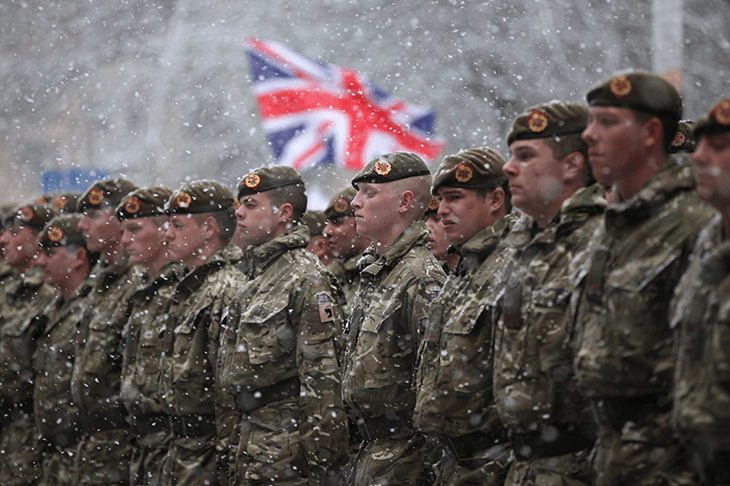Like most prime ministers, Boris Johnson has grown fond of deploying the military — albeit so far on the home front. Enthused by the army’s service in the London Olympics, he turned to them when the pandemic struck and 101 Logistic Brigade have been embedded in government ever since. They distributed PPE to frontline workers in March last year, and this year have become an integral part of the vaccine rollout. ‘The military don’t moan about health and safety regulation or a 40-hour week,’ says one minister. ‘Everything just works.’
The future of the military was this week laid out in a blueprint billed as the biggest strategic rethink for a generation. This is normally Whitehall code for huge cuts, but what’s strange this time is that the defence budget is about to have its biggest rise since the end of the Cold War. Though the army is still shrinking, the thinking behind this is not so much to break from the cycle of recent failure, but from a cycle of pretence: from the myths politicians tell themselves — and the public — about what the army can do.
Ben Wallace is the first Defence Secretary for decades to have served in the army. He left the Scots Guards for politics just as Tony Blair’s wars got underway. Britain ran into battle behind America, but with a fraction of its resources — and I saw the consequences for myself shortly after the invasion of Iraq. Britain pretended to take charge of Basra, the second city. We failed, leaving a security vacuum which was soon filled by Shi’ite death squads. Barbers were executed for shaving beards and Basra’s morgues filled up with the mutilated bodies of women accused of un-Islamic activity.

When Des Browne was defence secretary, he arranged a photoshoot with the governor of Basra to show the world that the city was safe. I was there and I can testify to the fact that the photo was a pretence. Troops had closed off every street within a 500-metre radius, and each entrance was guarded at gunpoint. The cup of tea with the governor lasted about 15 minutes before the army evacuated back to base far outside the city. It was all to spin a story: that peaceful Basra was being handed back to ‘the
Iraqis’. In fact the city was surrendered to the Mahdi army. Once the British evacuated, Basra had to be re-invaded by Iraqi troops — and its people liberated again.
The latest defence review asks: why did this happen? Why was the British army defeated by insurgents in southern Iraq? Why were we so badly equipped in Afghanistan? The answer in Whitehall is that Blair and Cameron were kidding themselves. A conspiracy of optimism was at work: soldiers were unrealistic about the prospects in Iraq, Afghanistan and Libya; politicians were overly hopeful about what could be done with a thinly stretched army. The idea now is to end the pretence.
There is to be a bolstered assessment centre, Sonac, to conduct ‘war gaming’ and ‘red teaming’ — military-speak for making sure unrealistic military deployment doesn’t happen again. There’s a new focus on the wars of the future, in which low-cost drones are bought by insurgents and used to take out British tanks, for instance. Already, Houthi rebels in Yemen have managed to get hold of Iranian ballistic missiles.
The Ministry of Defence has also been struck by the emergence of private defence companies like the Wagner Group, thought to be funded by the Kremlin and now operating in several African countries. How to fight against an enemy that doesn’t carry a flag? When Vladimir Putin invaded the Crimea, he used troops without identification. Such private companies, he says, are ‘a tool for the realisation of national interests without the direct participation of the state’.
There have always been mercenaries and private security firms, but Wagner is of a different order. Run by Dmitry Utkin, previously a special forces lieutenant colonel in Russia’s military intelligence service, it offers its clients airfields and even disinformation campaigns. Facebook said recently that it removed 274 fake accounts promoting pro-Russia narratives to people in places where Wagner operates: Mozambique, Sudan and Syria. To the MoD, this is an example of the new asymmetry of warfare – and a problem that won’t be remedied by a large standing army.
This is the largest-ever military budget in modern times, but the smallest-ever army
So the thinking is to deploy smaller forces in more places to deter adversaries from adventures, and to invest: overall defence spending will go up by 14 per cent. Set against rampant inflation in the defence world, that still won’t be enough — hence the cutbacks to standing armies. These cuts raise an obvious risk, mentioned by several retired military chiefs: that weakening the existing army invites new conflict. The risk of conventional war is low for any country likely to win one. Soften the defences, and provocation is more likely.
But has the pretence really ended? There has been talk of a naval base in Singapore — a hugely expensive undertaking which looks unrealistic on current budgets. This is downplayed by defence sources, who say the ships will be at sea rather than in on a base. But perhaps the bigger stretch is to think any committee of technocrats would or could veto any prime minister wishing to deploy. If there was an imminent threat, as was the case when Colonel Gaddafi was getting ready to bomb rebels in Benghazi, the PM would have his way. The military advised against the Libyan adventure — and were overruled.
It often doesn’t take long for prime ministers to discover their inner Churchill. Before entering No. 10, Cameron was using semi-pacifist language, mocking those who wish to ‘drop democracy from 40,000 feet’. In office, he sought to drop it on Tripoli from 1,000 feet. And he failed: Libya is now a collapsed state in which the Wagner Group is happily operating. The Foreign Office even fears that the Kremlin may use its influence there to encourage the flow of illegal migrants over the Mediterranean, and destabilise Europe that way.
So Johnson’s response to all this is the largest-ever military budget in modern times, but the smallest-ever army. Smarter, smaller deployments. If his new committee advises against deployment, he says he’ll exercise the restraint that Cameron and Blair lacked. Is he deceiving himself? With a more interventionist President in the White House, it may not be long before the call to arms comes from America. When it does, we’ll see if Churchill’s biographer is able to resist.







Comments